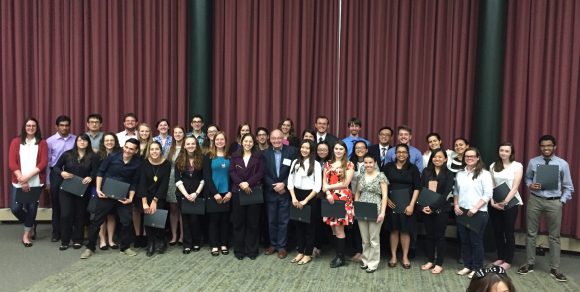
2016 George H. Cook Scholars.
By Samuel Ludescher (SAS ’18)
On April 15, the second floor of the Cook Campus Center was abuzz with students and faculty taking part in theses defenses for the George H. Cook Scholars Program. Sixty four students presented and defended their theses, the last stop in a year-long process of independent planning and research that begins in the spring semester of each student’s junior year.
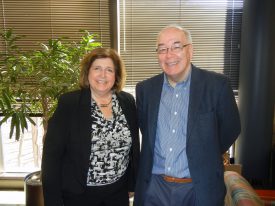
Janice Geiger, Administrative Assistant General Honors Program with Malcolm Watford, director George H. Cook Scholars Program, Department of Nutritional Sciences.
The program is presided over by Malcolm Watford, director of the George H. Cook Scholars Program and professor in the Department of Nutritional Sciences, and Janice Geiger, Administrative Assistant of the General Honors Program. Applicants of the George H. Cook Scholars Program must be in the top 15% of their class with a 3.45+ GPA. Students who achieve a 3.00 GPA are also eligible for the program if they are nominated by a SEBS faculty member. Honors projects must exhibit independence and originality. These presentations are opportunities for undergraduates to showcase their passion and ability to conduct independent research. The thesis defense is also a test of each student’s public speaking skills, a skill they must have sharpened in order to properly communicate their research to the audience. A member of the George H. Cook Honors Committee serves as session chair for each scientific category. The session chair is accompanied by a reviewer handpicked by the presenting student.
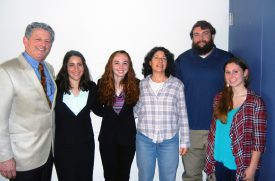
Larry Katz, professor, Emily Convery, Caitlin Kober, Susan Becker, research assistant and instructor, Bill Fritz Ph.D. candidate, Endocrinology & Animal Biosciences), and Victoria Simpson ’17 (next year’s George H. Cook Scholar)
Students are awarded a faculty project advisor of their choosing at the beginning of the process, one who helps in the planning and research of the student’s project. A strong relationship between student and project advisor helps in taking the training wheels off of the research process. For many George H. Cook scholars, it is the first time they are venturing into their scientific field on their own. “Research is nothing like the experiments you do in lab courses,” said biotechnology student Katie Fullerton, “because you might try something and realize it doesn’t work, or you don’t get the results that you expect, so you have to learn soft skills like problem solving and critical thinking to overcome these obstacles.”
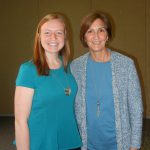
Kathryn Sinko and Wendie Cohick, professor and Chair of the Department of Animal Sciences.
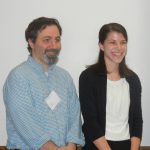
Nicholas Bello, associate professor of animal sciences and Hayley Cohen.
A secondary challenge embedded in the presentation of honors theses is being able to articulate a thesis defense in front of prominent faculty members. This tests each student’s public speaking skills as much as it does their research ability. One of the gifts that George H. Cook scholars walk away with is confidence. Varsha Poddar, a biochemistry student, said, “Defending my thesis was nerve-wracking, but I was confident in my knowledge about the topic. Actually, presenting in front of people helped to hone my public speaking skills.” The thesis defense is great practice for each scientist’s future, when he or she will be expected to not only process research, but to share it with a variety of audiences.
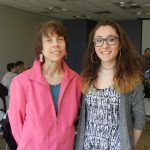
Julie Fagan, associate research professor in the Department of Animal Sciences and Christina Enoch.
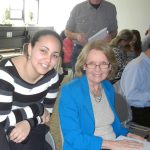
MaryNasr and Carol Bagnell, professor of animal sciences.
For many George H. Cook scholars, the program is also very affirming. “At first, being an ecologist was an aspiration of mine, something that would “eventually” happen,” said ecology student Carmela Buono, “but after participating in this program I see myself as a young ecologist now. That is not something that can be taught.” Once George H. Cook scholars brave the uncertainty of independent research, and succeed in presenting their honors thesis, completion of the program is acknowledged on their transcript and they are granted a scarlet-colored honors cord when they walk for graduation.

